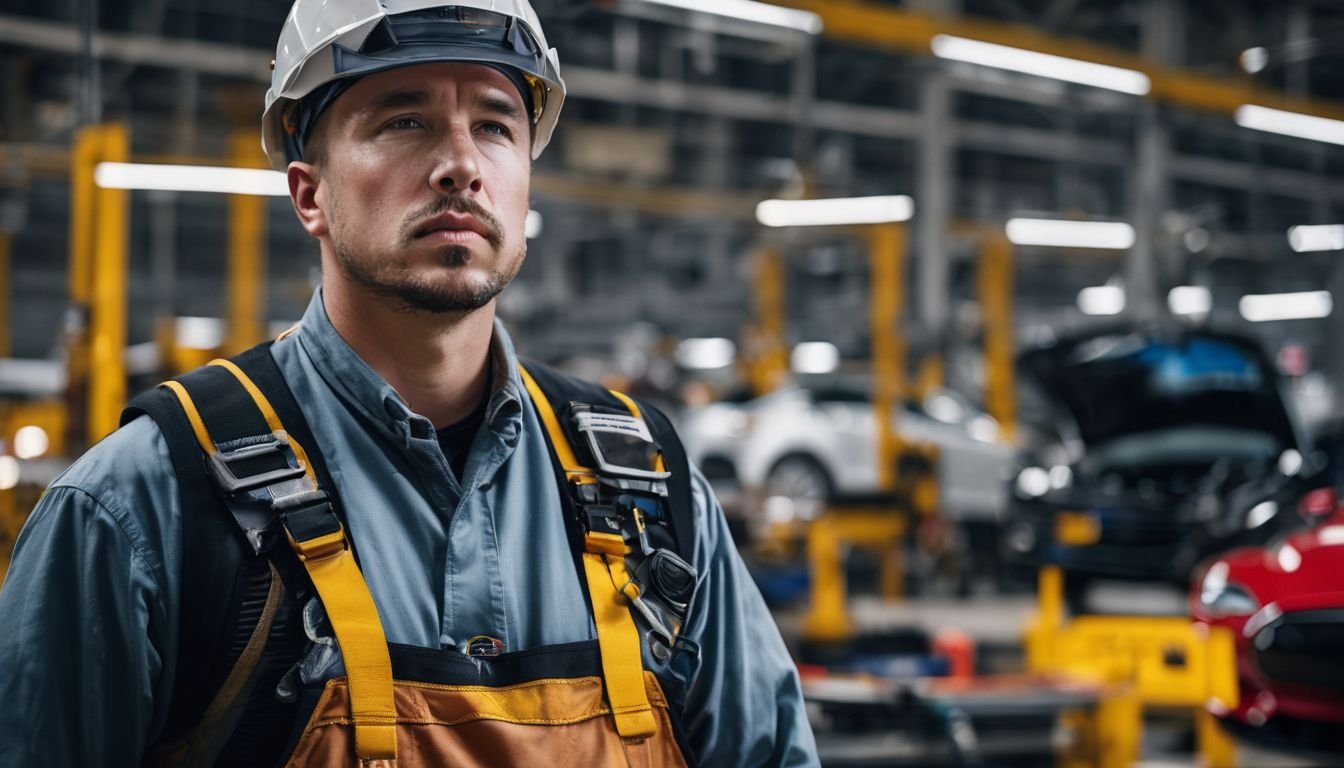Working at Tesla sounds exciting, but some employees tell a different story. Reports of tough conditions under the visionary Elon Musk have surfaced. We’ll uncover real accounts from those inside Tesla, showing you the not-so-shiny side of this innovative car company.
Let’s dive in.
Key Takeaways
- Ex – Tesla employees have reported facing long working hours, intense pressure to meet ambitious production goals, and hazardous conditions leading to injuries, dehydration, fainting spells, and even sleeping on the factory floor.
- The work culture at Tesla led by Elon Musk prioritizes achieving high production numbers, potentially resulting in physical and mental strain among workers and causing fear of job loss for those who speak up about their concerns.
- Concerns about possible violations of labor laws have been raised due to reports of incidents like abnormal breathing, prolonged working shifts without adequate rest breaks or compensation for overtime hours. These issues highlight the need for closer scrutiny regarding potential workplace conditions’ violations within the company.
Ex-Tesla Employees Speak Out on Working Conditions

Ex-Tesla employees have reported long hours, intense pressure, injuries, hazardous conditions, dehydration and fainting, and even sleeping on the factory floor.
Long hours
Workers at Tesla’s factory often face extremely long hours. Some have to work shifts that last much longer than the usual eight hours, and many times this includes mandatory overtime.
This can lead to workers feeling very tired and stressed because they do not get enough rest.
The push to keep production numbers high means working late into the night is common. Employees talk about how hard it is to see their families or take care of themselves because they spend so much time on the assembly line.
This can hurt both their bodies and minds over time.
Intense pressure
Beyond the long hours, Tesla factory workers face another challenge: intense pressure. Elon Musk’s big goals mean teams must work fast to build enough cars. This rush can cause stress and mistakes on Tesla’s assembly line.
Employees feel they must always do more and faster to keep up with the CEO’s ambitious production goals.
This push for speed puts a heavy load on everyone, from production workers to engineers. They often worry about job safety if they don’t meet targets or speak up about problems. The fear of falling behind or losing their jobs keeps many quiet about the tough spots they’re in.
Inside Tesla’s walls, rushing and stress are just part of the day-to-day scene for those building our future rides.
Injuries and hazardous conditions
Workers at Tesla’s Fremont factory have faced tough conditions. Many of them got hurt doing their jobs. Reports show that some workers suffered from bad injuries like herniated discs and problems with breathing.
The number of these injuries was higher than the industry average, meaning Tesla had more accidents than other car places.
These hard conditions weren’t just about getting hurt. The factory could be a risky place to work in other ways too. Employees talked about unsafe working conditions where people might pass out or get hit by moving parts on the assembly line.
They worked beside fast-moving machines and carried heavy battery packs, which upped the chance of something going wrong.
Next, we’ll look into how frequent dehydration and fainting were among the employees due to overwork and poor management practices.
Dehydration and fainting
After enduring injuries and hazardous conditions, Tesla employees also face the risk of dehydration and fainting. The demanding work shifts in intense production environments make it challenging for workers to stay hydrated, leading to instances of fainting spells on the factory floor.
This further adds to the physical strain placed on employees, exacerbating their already difficult working conditions.
The harsh working environment at Tesla raises serious concerns about employee well-being, as incidents of dehydration and fainting highlight the extreme toll that long hours and all-consuming work culture have on workers’ health.
Sleeping on the factory floor
Some Tesla employees have reported sleeping on the factory floor due to long working shifts and intense pressure to meet production goals. This practice reflects the extreme work culture at Tesla, where employees are pushed to their limits in order to keep up with demanding deadlines and production numbers.
The physical and mental strain of such conditions can take a toll on the well-being of workers, making it difficult for them to maintain a healthy work-life balance.
– Tesla’s “Ultra Hardcore” Work Culture
Tesla’s “Ultra Hardcore” Work Culture

Elon Musk leads a work culture at Tesla that places intense pressure on employees to meet production goals and may involve the silencing of employee concerns.
Led by Elon Musk
Elon Musk leads Tesla with an intense work culture that prioritizes meeting production goals. This creates high pressure for employees, possibly leading to violations of labor laws and silencing of concerns.
Musk’s leadership has contributed to physical and mental strain among workers, impacting their work-life balance and creating a fear of losing their jobs.
Tesla’s “ultra hardcore” work culture is exemplified by the pressures imposed to meet production goals while potentially disregarding employee well-being. The impact on employees in terms of physical and mental strain raises serious concerns about the sustainability of such working conditions.
Pressure to meet production goals
Led by Elon Musk’s vision, Tesla fosters a work culture that emphasizes extreme pressure to meet production goals. This relentless push for high output often leads to excessive working hours and intense demands on employees.
The need to achieve ambitious targets can create an all-consuming atmosphere, where workers face significant physical and mental strain as they strive to keep up with the demanding pace of production.
The unyielding focus on meeting these goals has raised concerns about the well-being of Tesla employees and potential violations of labor laws, reflecting the severe impact of this unforgiving work environment.
Silencing of employees
Pressure to meet production goals creates a culture where employees feel silenced and fearful of speaking up about working conditions. Instances of possible labor law violations create an atmosphere where employees are hesitant to report injuries or express concerns due to the fear of retaliation from higher management.
This lack of open communication contributes to the continued physical and mental strain on workers, as they endure long hours and intense pressure without feeling heard or supported.
Furthermore, reports indicate that there have been incidents where employees who voiced their discontent were reprimanded or even fired, leading others to remain silent out of fear for their job security.
Possible violations of labor laws
Following the silencing of employees, there are concerns about possible violations of labor laws at Tesla. Reports indicate incidents like abnormal breathing, injuries resulting in medical leave, and workers experiencing chest pains.
The pressure to meet production numbers ahead of schedule has led to prolonged working shifts without adequate rest breaks or compensation for overtime hours. In addition, there have been cases of lower wages and difficulties in maintaining a work-life balance due to all-consuming work demands.
Tesla’s “ultra hardcore” work culture, led by CEO Elon Musk, may be creating an environment where employees face physical strain and are at risk of sustaining life-changing injuries.
Impact on Employees
Employees at Tesla face physical and mental strain, struggle to maintain work-life balance, and fear losing their job. Read on to learn more about the harsh reality of working conditions at Tesla.
Physical and mental strain
Working at Tesla often leads to significant physical and mental strain for employees. The long working shifts, intense pressure to meet production goals, and fear of losing their job contribute to this strain.
Many workers face difficulty maintaining a work-life balance due to the all-consuming nature of their jobs. Additionally, injuries sustained on the job can lead to life-changing medical issues, further adding to the physical and mental toll experienced by employees.
The physically demanding nature of the work also takes a toll on workers’ bodies. Repetitive stress injuries from tasks on the assembly line, such as incurring two herniated discs or suffering life-changing injuries like one man’s leg caught in machinery, are just some examples of this strain.
Difficulty maintaining work-life balance
Maintaining a balance between work and personal life at Tesla proves challenging for employees. The long hours, intense pressure to meet production goals, and the all-consuming work culture make it hard for them to find time for relaxation or family.
Many workers struggle with fatigue and stress due to their demanding shifts on the assembly line, leading to physical and mental strain.
The fear of losing their jobs also adds to the difficulty of achieving a healthy work-life balance. With reports of low wages and possible violations of labor laws, employees face constant uncertainty about their future at Tesla.
This environment makes it increasingly tough for them to carve out time for themselves outside of work pressures.
Fear of losing job
Transitioning from the challenges of maintaining work-life balance, many Tesla employees experience a fear of losing their jobs. The intense pressure to meet production goals and the all-consuming work culture at Tesla contribute to an environment where job security feels precarious.
Some workers are hesitant to report injuries out of concern for potential repercussions.
The fear of losing their jobs adds another layer of stress to already physically and mentally demanding working conditions faced by Tesla employees. This fear may lead some workers to continue working despite injuries or hazardous conditions, further compromising their well-being.
Conclusion
In conclusion, the firsthand accounts of ex-Tesla employees shed light on the intense working conditions within the company. The pressure to meet production goals and long hours have taken a toll on workers both physically and mentally.
With concerns about possible labor law violations and silencing of employees, it’s clear that Tesla’s work culture has significant implications for its workforce. It is crucial for companies like Tesla to prioritize employee well-being and address these pressing issues for a sustainable future.
FAQs
1. What are the working conditions like at Tesla?
The working conditions at Tesla can be tough, with workers doing physical labor on the assembly line. Some have faced injuries and other medical issues.
2. Has Elon Musk said anything about Tesla’s working conditions?
Tesla CEO Elon Musk often shares news about Tesla, but he has not talked much about the problems workers face.
3. Have there been many injuries at Tesla?
Yes, reports show that injured employees on battery pack lines and elsewhere have suffered life-changing injuries while making cars.
4. Do all auto companies have harsh working conditions like Tesla?
Not all auto companies have the same issues; some may treat their production technicians better or worse than those at Tesla.
5. Why do people keep working at Tesla if it’s so hard?
Some work for pay even when shifts are long because jobs in California aren’t easy to find, and they hope things will get better.
6. Are there any good parts of working at Tesla?
While we hear many examples of hard times, some co-workers enjoy being part of an innovative auto industry that could change how we use cars with futuristic robots and new ideas.









Leave a Reply